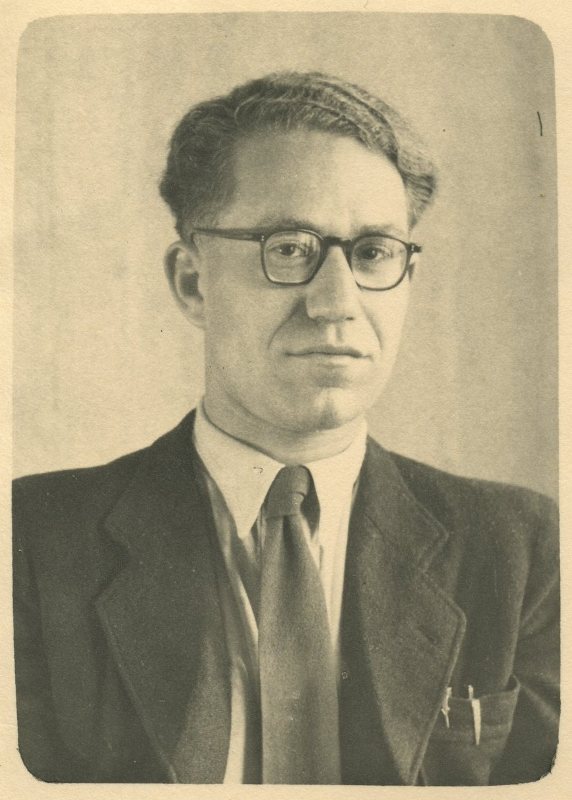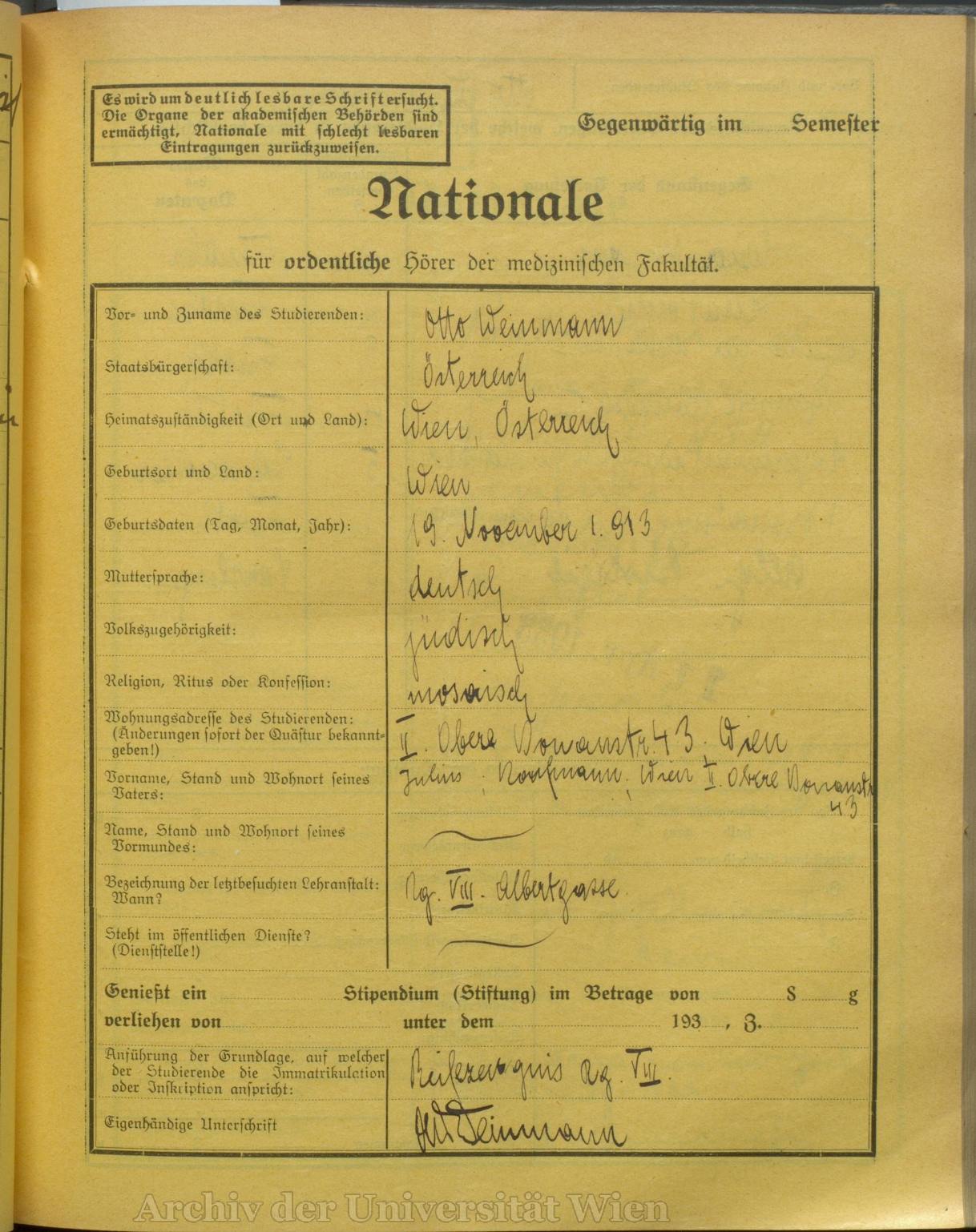
| Born: | 11-19-1913 |
| Faculty: | Medical School | Medical University Vienna |
| Category: | Expelled student |
Otto WEINMANN, born on November 19th, 1913, in Vienna/Austro-Hungarian Empire (entitled residency ("heimatberechtigt") for Vienna/Austria, citizenship 1938: Austria), was the son of the merchant Julius Weinmann (1881-1934) and his wife Irma, née Hahn (1889-1943). He lived with his parents and his siblings Walter (1910-1981) and Herta (1915-1945) in Vienna's 2nd district, Obere Donaustraße 43 from 1919.
After his school-leaving examination at the Realgymnasium in Vienna's 8th district, Albertgasse, Otto Weinmann began studying at the Medical School of the University of Vienna in the fall term of 1932/33. He was last enrolled at the Medical School in the 5th year in the fall term of 1937/38 (his "Absolutorium" (certificate of study completion) was issued on November 3rd, 1938).
After several months of uncertainty and intensive study - "I studied while standing in order not to fall asleep" - he was able to complete the six outstanding rigorous examinations in October 1938 and complete his studies on October 31st, 1938 within the discriminating ceremony of a non-Aryan promotion ("Nichtarierpromotion"), which implied being banned from his profession in the German Reich, which was noted on his diploma.
He recalled that Dean Eduard Pernkopf refused to shake his hand when he was informally presented with his diploma, but for Otto Weinmann the doctorate was nonetheless crucial - “I would not have survived without my doctorate” - as it was useful to him in his French emigration.
Otto Weinmann fled across the border to Belgium on New Year's Eve 1938 with the help of a passer near Aachen. He was arrested in Brussels as an illegal immigrant and interned in the Merxplas camp in Belgium. During the four to five months he was imprisoned there, he was appointed a doctor and exempted from heavy labor despite not having a medical practice. During his monthly release, he was able to make contact with a cousin of his grandmother in Brussels, who got him an unpaid job at the Pasteur Institute in Brussels (bacteriology and serology). With proof of the job, he was released from the internment camp and was able to survive with financial support from the Jewish community.
His brother Walter and his mother Irma managed to escape to the USA; she died in New York City in 1943. His sister Herta was able to flee to Colombia with her husband Walter Engel in 1938. She died in Bogotá in 1945.
When the German Wehrmacht occupied Belgium on May 10th, 1940, Otto Weinmann was arrested as a foreigner and deported to France two days later. During the transport to Toulouse, one of the wagons was hit by bombs and Otto Weinmann had to care for the seriously injured prisoners together with other doctors in the camp. After arriving at the St. Cyprien internment camp on June 18, 1940, he continued to work as a doctor, which gave him life-saving “privileges” such as his own doctor's barrack. There he met Professor Fritz Lieben by chance, whom he knew from his studies at the University of Vienna. When a typhus epidemic broke out in the camp in August 1940 and Otto Weinmann fell ill, he was taken to the St. Louis Hospital in Perpignan, where he again received preferential treatment as a doctor. In September 1940, he was formally transferred from the camp in St. Cyprien to the Gurs camp, where he was listed as an inmate until March 1941. However, he was actually able to stay in Perpignan and take up an unpaid position at the St. Louis hospital. He worked there as an outpatient doctor until August 1942.
From August 1942, raids were carried out and he had to leave the hospital and hide in an apartment with two other refugees. He met the French woman Simone Pasquet, who took him to Banyuls-sur-Mer at the foothills of the Pyrenees, from where he was supposed to walk to Spain at night with the help of a passeur. When he broke his leg during the march and was unable to continue, he was left behind by the group. He had to stay there for one or two days until a farmer found him and the police brought him back to Banyuls on a stretcher. As Otto Weinmann pretended to be Belgian, he was taken to a French hospital, where he was able to stay and study until November 1943 thanks to the protection of a “Jew-friendly” doctor. He then found shelter with a family in Perpignan for two months.
Simone Pasquet provided him with papers with a false identity (“Albert Baudouin”) and place of birth on the Belgian border, money for a train journey to Lyon and addresses where he could get help. In Lyon, he spent the last months of the war in changing accommodation.
On August 20, 1944, Otto Weinmann witnessed the liberation of Lyon. Through an acquaintance, he was offered a job as director of a children's home in Saint-Paul-en-Chablais in January 1945, remained there until November 1945 and also treated patients unofficially as a doctor. However, as he did not have a license to practice medicine, he decided to leave France.
In January 1947, he traveled back to Vienna for the first time and met a former demonstrator from the University of Vienna who had returned to England from emigration. He found him a job at the Wilhelminenspital in Vienna 16. Before his final return to Vienna, he married Margot Rechter (1922-2010), a native of Berlin, in Paris.
When he returned to Vienna for good in May 1947, he was also given an apartment in the center of Vienna that had previously been occupied by the British. He later lived in Vienna 3, Bechardgasse 25/11.
Their daughter Dorit (Doris) Knobel was born in 1951. The marriage ended in divorce a few years later and his divorced wife moved to Israel.
After working at the hospital for a few years, Otto Weinmann was licensed by the Vienna Medical Association as a specialist in internal medicine in June 1952 and opened an internal medicine practice in May 1953 (Thaliastrasse 2/5, corner of Gürtel), which he ran for 36 years. He worked as an internist in Vienna until the end of the 1980s. He also worked as a medical officer for the insurance company of the Austrian railroads.
In October 1999, Otto Weinmann and other expelled students were honored by the Medical Faculty of the University of Vienna. Rector Wolfgang Greisenegger and Dean Wolfgang Schütz presented Otto Fleming, Rita Krause, Heinz Pollak, Friedrich Seid, Zvi Shamir and Otto Weinmann with honorary diplomas.
Otto Weinmann died on May 6, 2010 in Vienna.
Lit.: Archive of the University of Vienna/enrollment forms ("Nationale") MED 1932-1938, graduation registry ("Promotionsprotokoll") MED 1929-1941, No. 4172; Municipal and Provincial Archives of Vienna WStLA/Opferfürsorgeakten (relief fund), WStLA/Aerztekammer Wien, K2/1 - Kartei: Aerztinnen und Aerzte (registry physicians); USC Shoah Foundation Institute for Visual History and Education, University of Southern California, Interview 27143 (Vienna 1997); POSCH/INGRISCH/DRESSEL 2008, 497; KNIEFACZ/POSCH 2017c; REITER-ZATLOUKAL/SAUER 2025; information by courtesy of his daughter Dorit Knobel, Israel 09/2009 and of Dr. Barbara Sauer, Vienna 07/2019 and 04/2025; www.geni.com; Hohenems Genealogy.
Katharina Kniefacz

